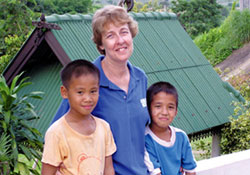Companions on the journey
Learning what it means to walk with the people in cross-cultural mission
By Susan Keays
October 2004
Return to Table of Contents
Print Article
An expression that lay missioners often use to describe what we do in cross-cultural mission is, "walk with the people." In my statement, read at the missioning ceremony in Toronto to mark the end of our training, I declared my intention to walk with the people of Thailand for the next three years.

Susan Keays with Somchai and Ponchai. Chiang Rai, Thailand.
After language school and once I began the work I was called to do, I quickly realized that I received from the people far more than I gave. However, it wasn't until this past Lent that I more fully comprehended the implications of the expression, "walk with the people." Yes, I do walk with them, but I had given little thought to the flip-side of the equation: the people of Thailand also walk with me. This was demonstrated very simply by two seven-year-old boys named Somchai and Ponchai.
I live and work at the Camillian Social Centre, a home for children of Thailand's hill tribes. We are situated in the northern province of Chiang Rai, very near the famous Golden Triangle. This year, 170 boys and girls, aged seven to 14, live at the home. Our children are generally not orphans, but their parents and families are distressingly poor. Often, one or another of the parents is seriously ill, has died, or is in jail. The Centre assists and supports these families during the school year by clothing, housing and educating the children.
Many of the hill-tribe people are Catholic, while some are Buddhist and others are animist. When the children first arrive, many of them speak only their tribal language, generally Akha, Lanna or Mong. However, there is no division among them; they live, work, play and pray together joyfully.
One day before Easter, I had been out on errands and when I returned, I saw many of the staff and children outdoors finishing their Way of the Cross devotions. At the beginning of Lent, 14 simple bamboo crosses had been erected on the premises. I found it moving to participate in the familiar liturgy with the others, trekking the hills from cross to cross. This time I set out on my own.
Going down the hill a little way to the first cross, I began my reflection in silence. I hadn't gotten further than the second or third station before two seven-year-old boys joined me. They didn't say a word; they just stood there, one at my right and the other at my left.
I expected that they would soon be on their way, in search of something a little more lively and engaging to do. However, as I moved to the next station, my little companions, Ponchai and Somchai, wordlessly walked along with me. Again they stood at my side, never speaking, never fidgeting, while I reflected and prayed.
And so we went. Together. Walking in the way of the Lord. As I focused on Jesus' journey, I couldn't help but marvel and give thanks for the two little angels who had transformed my solitary sojourn. Intended to mark Jesus' passion and death, it had become a profound experience of resurrection and life.
These days, if I say that I walk with the people of Thailand, I'm keenly aware of their presence at my side. I walk with them. They walk with me. It's a reciprocal relationship of love and solidarity, a lesson that was brought home to me by the faithfulness and companionship of two small boys who trudged the hills and the Way with me that day in Lent.

Scarboro missioner Dorothy Novak accompanies exploited and disempowered women at the Fatima Self Help Centre run by the Good Shepherd Sisters in Bangkok. The Centre's programs help 150 women to provide for their families through education and skills training, and with the making of crafts that are sold by groups around the world.
Dorothy writes: "I wish everyone could experience life here on the other side of the world with millions of beautiful people, knowing we are all the same despite our religious and cultural differences. It is an experience of a lifetime and I continue to thank God every day for the gift of being here. I know it is only through the grace of God and with the continued prayers and support of Scarboro Missions, my family and friends that I continue my mission in Thailand.
Return to Table of Contents
Print Article